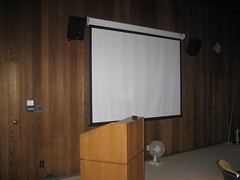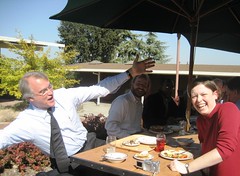I was catching up with a friend recently who, after receiving a Master’s degree, decided to move to a professionally less-than-ideal location for personal reasons. She’s been doing okay by picking up work here and there, but it’s been a long process. She was explaining to me the frustrations of being told that you are overqualified for a job. I could definitely see her perspective and was nodding throughout her desciption of various recent experiences. But after the responses I received to my recent post (posted on Crooked Timber, I seemed to have forgotten to post it here as well) about outsourcing advice, I am starting to understand the other side’s position better. A few people emailed me offering their services. The problem is, pretty much all of them seem to be overqualified, which puts me in a difficult position.
My motivation for looking into outsourcing was twofold: 1. to see whether I could find additional assistance with work since undergraduate students don’t always have as many hours to give to a project as is necessary and there are a limited number of graduate students locally; 2. to see whether I could save some money by hiring people elsewhere.
Certainly, removing the geographical constraint of the job helps and clearly there are people out there who could use some work that is open to a flexible schedule. However, it’s not at all clear whether there is much money to be saved.
First, my impression regarding outsourcing services available online is that they may be cost-effective if you need highly qualified people (specialized tech skills, for example), but there was nothing on the various Web sites that made me think I would necessarily come out ahead by hiring people from elsewhere for the jobs of interest to me (some data entry, transcription and such). I pay undergraduate students $8-$9/hour and the sites I saw didn’t seem to compete with that well.
Second, I got responses from people who sound like they would be very responsible and could definitely do the job well, but they seemed overqualified. Years ago I paid graduate students $10/hour so today that seems inappropriate. However, I wouldn’t want to pay more for these tasks than I do to people working on them locally. I have no idea what the going rate is in various fields. I know in computer science it is much much higher, but what is it in humanities fields? Perhaps what seems inappropriate to me would be fine for some people who are really just looking for something flexible to supplement their income.
I definitely know from experience that I don’t always do a very good job of estimating what may be a perfectly acceptable job and wage for a student. I sometimes feel badly about giving out very simple tasks, but then I remind myself that I was just fine with cleaning bathrooms and dishes – those were two separate jobs:) – in my first year in college and was outright happy later on with my job in the library and doing simple tasks for professors.
But when it comes to graduate students or people with advanced degrees, this all gets trickier. I do not want to insult someone with an advanced degree by suggesting a rate that seems way too low to me. At the same time, the potential employee does not want to mention a rate with the fear of asking for less than what I am willing to pay. Regarding this latter point, the potential employees don’t know that I won’t pay people in similar situations less than what I already pay others. (I would if the person lived in a country with much lower cost of living. Thus my inquiry about outsourcing.) That is, if an undergraduate student came to me to volunteer his or her services for free in my lab, I would still only hire him or her with pay, because I believe that a person will take the job more seriously if he or she is getting paid for it. Moreover, because others in the lab are getting paid, I believe everyone should unless there is a different payoff to the assistant. For example, an undergraduate student might work without pay on one of my projects if he or she is getting course credit as per his or her preference.
Of course, it is too simplistic to see this as nothing but an hourly wage issue. It is completely possible that people with more training or background with related work would do the job more efficiently and thus would not cost more on the aggregate even if their hourly rate is higher. But this would require quite a bit of logistics to figure out. (There is some cost to starting work with a new person and training them for a task so you don’t want to get too many folks involved.)
I will be hiring for a full-time position soon. I will make sure to post the salary up front to avoid the above complications. If people see what a position pays then it should be fair to assume that even if they are overqualified, they are willing to work for the offered amount if they decided to submit an application. That still doesn’t solve all concerns, by the way, given that the employer may fear losing the employee to a better opportunity. But at least it removes one point of confusion.






